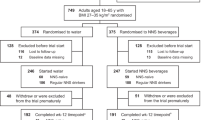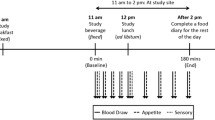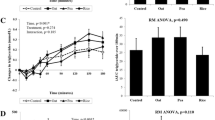Abstract
Background/Objectives:
To compare the effect of low-dose whey protein-enriched and sucrose-enriched water beverages on postprandial satiety and energy intake.
Subjects/Methods:
Sixty overweight and obese women were given water-based protein and carbohydrate (CHO) beverages or placebo on six different occasions in a double-blind, randomised cross-over study. The beverages were 2 (178 kJ) and 4% (348 kJ) protein-enriched water (Clear Protein8855), 2 (157 kJ), 4 (314 kJ) and 10% (785 kJ) sucrose-enriched water, and a sweetened water control. Beverages were matched for volume, colour, flavour and sweetness. A standardised evening meal was provided before each study day and a standardised breakfast upon arrival at the clinic at 0900 hours. The beverage preload was given midmorning at 1100 hours, and an ad libitum outcome lunch meal at 1300 hours. Subjective appetitive responses were recorded through the day until 1500 hours using visual analogue scales.
Results:
Fifty-five participants completed all six beverage conditions. Neither protein nor sucrose preloads decreased any of hunger, fullness, thoughts of food or satisfaction when compared with the sweetened water control beverage (all, P>0.05). There was also no significant effect on ad libitum energy or macronutrient intake at the outcome meal (P>0.05), with no compensation for the energy consumed within the preload beverages.
Conclusions:
There was no evidence of increased postprandial satiety or compensation for energy content at an outcome lunch meal when a water beverage was supplemented with up to 4% (w/w) whey protein or 10% (w/w) sucrose, in a group of overweight but unrestrained young and middle-aged women.



Similar content being viewed by others
References
Mattes RD . Beverages and positive energy balance: the menace is the medium. Int J Obes 2006; 30: S60–S65.
Caprio S . Calories from soft drinks-do they matter? N Engl J Med 2012; 367: 1462–1463.
Bray GA, Popkin BM . Dietary sugar and body weight: have we reached a crisis in the epidemic of obesity and diabetes?: health be damned! Pour on the sugar. Diabetes Care 2014; 37: 950–956.
Wang YC, Bleich SN, Gortmaker SL . Increasing caloric contribution from sugar sweetened beverages and 100% fruit juices among US children and adolescents, 1988-2004. Pediatrics 2008; 121: e1604–e1614.
Poppitt SD, Eckhardt JW, McGonagle J, Murgatroyd PR, Prentice AM . Short-term effects of alcohol consumption on appetite and energy intake. Physiol Behav 1996; 60: 1063–1070.
Crapo PA, Henry RR . Postprandial metabolic responses to the influence of food form. Am J Clin Nutr 1998; 48: 560–564.
Mourao D, Bressan J, Campbell WW, Mattes RD . Effects of food form on appetite and energy intake in lean and obese young adults. Int J Obes (Lond) 2007; 31: 1688–1695.
Mattes RD, Campbell WW . Effects of food form and timing of ingestion on appetite and energy intake in lean and obese young adults. J Am Diet Assoc 2009; 109: 430–437.
Bes-Rastrollo M, Schulze MB, Ruiz-Canela M, Martinez-Gonzalez M . Financial conflicts of interest and reporting bias regarding the association between sugar-sweetened beverages and weight gain: a systematic review of systematic reviews. PLoS Med 2013; 10: e1001578.
Hu FB . Resolved: there is sufficient scientific evidence that decreasing sugar-sweetened beverage consumption will reduce the prevalence of obesity and obesity-related diseases. Obes Rev 2013; 14: 606–619.
Massougbodji J, Bodo YL, Fratu R, Wals PD . Reviews examining sugar-sweetened beverages and body weight: correlates of their quality and conclusions. Am J Clin Nutr 2014; 99: 1096–1104.
Halton TL, Hu FB . The effects of high protein diets on thermogenesis, satiety and weight loss: a critical review. J Am Coll Nutr 2004; 23: 373–385.
Bowen J, Noakes M, Trenerry C, Clifton PM . Energy intake, ghrelin, and cholecystokinin after different carbohydrate and protein preloads in overweight men. J Clin Endocrinol Metab 2006; 91: 1477–1483.
Poppitt SD, McCormack D, Buffenstein R . Short-term effects of macronutrient preloads on appetite and energy intake in lean women. Physiol Behav 1998; 64: 279–285.
Weigle DS, Breen PA, Matthys CC, Callahan HS, Meeuws KE, Burden VR et al. A high protein diet induces sustained reductions in appetite, ad libitum caloric intake and body weight despite compensatory changes in diurnal plasma leptin and ghrelin concentrations. Am J Clin Nutr 2005; 82: 41–48.
Anderson GH, Moore SE . Dietary proteins in the regulation of food intake and body weight in humans. J Nutr 2004; 134: 974S–979S.
Clifton PM, Keogh JB, Noakes M . Long-term effects of a high-protein weight-loss diet. Am J Clin Nutr 2008; 87: 23–29.
Kushner RF, Doerfler B . Low-carbohydrate, high-protein diets revisited. Curr Opin Gastroenterol 2008; 24: 198–203.
Noakes M . The role of protein in weight management. Asia Pac J Clin Nutr 2008; 17: 169–171.
Paddon-Jones D, Westman E, Mattes RD, Wolfe RR, Astrup A, Westerterp-Plantenga M . Protein, weight management, and satiety. Am J Clin Nutr 2008; 87: 1558S–1561S.
Luhovyy BL, Akhavan T, Anderson GH . Whey proteins in the regulation of food intake and satiety. J Am Coll Nutr 2007; 26: 704S–712S.
Poppitt SD, Proctor J, McGill AT, Wiessing KR, Falk S, Xin L et al. Low-dose whey protein-enriched water beverages alter satiety in a study of overweight women. Appetite 2011; 56: 456–464.
St-Onge MP, Rubiano F, DeNino WF, Jones A Jr, Greenfield D, Ferguson PW et al. Added thermogenic and satiety effects of a mixed nutrient vs a sugar-only beverage. Int J Obes Relat Metab Disord 2004; 28: 248–253.
Bertenshaw EJ, Lluch A, Yeomans MR . Satiating effects of protein but not carbohydrate consumed in a between-meal beverage context. Physiol Behav 2008; 93: 427–436.
Bertenshaw EJ, Lluch A, Yeomans MR . Dose-dependent effects of beverage protein content upon short-term intake. Appetite 2009; 52: 580–587.
Dove ER, Hodgson JM, Puddey IB, Beilin LJ, Lee YP, Mori TA . Skim milk compared with a fruit drink acutely reduces appetite and energy intake in overweight men and women. Am J Clin Nutr 2009; 90: 70–75.
Bowen J, Noakes M, Clifton PM . Appetite regulatory hormone responses to various dietary proteins differ by body mass index status despite similar reductions in ad libitum energy intake. J Clin Endocrinol Metab 2006; 91: 2913–2919.
Lam SM, Moughan PJ, Awati A, Morton HR . The influence of whey protein and glycomacropeptide on satiety in adult humans. Physiol Behav 2009; 96: 162–168.
Bowen J, Noakes M, Clifton PM . Appetite hormones and energy intake in obese men after consumption of fructose, glucose and whey protein beverages. Int J Obes (Lond) 2007; 31: 1696–1703.
Almiron-Roig E, Drewnowski A . Hunger, thirst, and energy intake following consumption of caloric beverages. Physiol Behav 2003; 79: 767–773.
Bertenshaw EJ, Lluch A, Yeomans MR . Perceived thickness and creaminess modulates the short-term satiating effects of high-protein drinks. Br J Nutr 2013; 110: 578–586.
Hall WL, Millward DJ, Long SJ, Morgan LM . Casein and whey exert different effects on plasma amino acid profiles, gastrointestinal hormone secretion and appetite. Br J Nutr 2003; 89: 239–248.
Veldhorst MA, Nieuwenhuizen AG, Hochstenbach-Waelen A, vanVught AJ, Westerterp KR, Engelen MP et al. Dose-dependent satiating effect of whey relative to casein or soy. Physiol Behav 2009; 96: 675–682.
Poppitt SD, Strik CM, McArdle BH, McGill AT, Hall RS . Enhanced serum amino acid profile but no evidence of appetite suppression by dietary glycomacropeptide (GMP): a comparison of dairy whey proteins. J Am Coll Nutr 2013; 32: 177–186.
Stunkard AJ, Messick S . The three-factor eating questionnaire to measure dietary restraint, disinhibition and hunger. J Psychosom Res 1985; 29: 71–83.
Blundell J, deGraaf C, Hulshof T, Jebb S, Livingstone B, Lluch A et al. Appetite control: methodological aspects of the evaluation of foods. Obes Rev 2010; 11: 251–270.
Weissing K, Xin L, McGill A-T, Budgett SC, Strik CM, Poppitt SD . Sensitivity of ad libitum meals to detect changes in hunger: restricted-item or multi-item testmeals in the design of preload appetite studies. Appetite 2012; 58: 1076–1082.
Harper A, James A, Flint A, Astrup A . Increased satiety after intake of a chocolate milk drink compared with a carbonated beverage, but no difference in subsequent ad libitum lunch intake. B J Nutr 2007; 97: 579–583.
Acknowledgements
We thank Ramon Hall, Janie Proctor, Sofie Falk and Shelley Baty who provided technical assistance on this trial. We also thank the participants in this intervention study.
Author information
Authors and Affiliations
Corresponding author
Ethics declarations
Competing interests
Beverages were supplied by Fonterra Co-operative Group Ltd, New Zealand. SDP holds the Fonterra Chair in Human Nutrition at the University of Auckland, Auckland, New Zealand.
Rights and permissions
About this article
Cite this article
Wiessing, K., Xin, L., Budgett, S. et al. No evidence of enhanced satiety following whey protein- or sucrose-enriched water beverages: a dose response trial in overweight women. Eur J Clin Nutr 69, 1238–1243 (2015). https://doi.org/10.1038/ejcn.2015.107
Received:
Revised:
Accepted:
Published:
Issue Date:
DOI: https://doi.org/10.1038/ejcn.2015.107
- Springer Nature Limited




